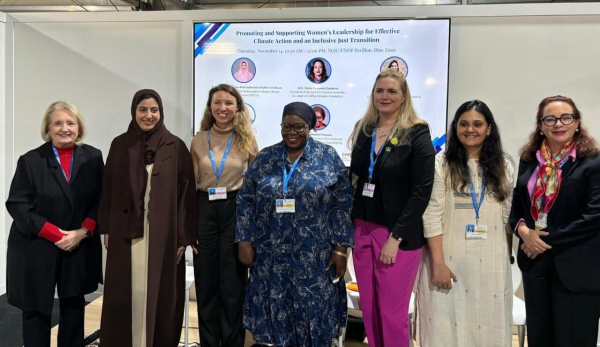A delegation from the Georgetown Institute for Women, Peace and Security (GIWPS), which promotes the role of women in addressing global issues, attended the 2024 United Nations Climate Change Conference, or COP29, a United Nations climate change conference hosted in Baku, Azerbaijan Nov. 11-22, hearing from international policy leaders and advising developed countries to take on a larger economic role to combat climate change.
GIWPS’s delegation hosted two panels: “Promoting and Supporting Women’s Leadership for Effective Climate Action and an Inclusive Just Transition” and “The Gender, Climate and Security Nexus: Environmental Destruction in Conflict-Affected Settings and the Role of Women in Conservation and Restoration Efforts.” Ambassador Melanne Verveer, the institute’s executive director, moderated both panels.
Verveer said it is important to emphasize climate change as an intersectional issue, which can lead to regional conflicts over limited resources.

“As climate impacts are occurring and people are losing the ability to eke out an existence on their land, for example, they’re forced away from where they live because they can no longer make it,” Verveer told The Hoya. “They can no longer adapt. They don’t have the tools for adaptation.”
COP occurs annually and provides a forum for member states to discuss the effects of climate change within their own borders and develop international solutions. This year, the conference agreed on high standards to curb the rise in global temperatures, address climate financing programs and give resources to less developed countries. The conference also affirmed the importance of prioritizing climate solutions as a way of mitigating other international issues.
Marcus King, an environment and international affairs professor in the School of Foreign Service, said climate change is a global security risk.
“Geopolitical tensions are likely to grow with allies and adversaries as arguments continue about how to accelerate the emissions reductions needed to meet the Paris Agreement goals,” King wrote to The Hoya. “Countries such as China will undermine U.S. security as they compete to control resources and dominate the technologies needed for the clean energy transition.”
Safak Yucel, an associate professor at the McDonough School of Business and associate director at the Business of Sustainability Initiative, which examines sustainability through a business and economic lens, said the financial resolutions that arose from the conference were not well received.
“The resulting agreement does not seem to be much appreciated by the least developed countries, who were expecting more funds and stronger commitment from developed nations,” Yucel wrote to The Hoya. “The delegates of developed nations, though, are claiming that they are working with tight budgets after inflationary pressures of the last few years. Overall, none of the parties seem to be happy with the outcome of the negotiations.”
With talks running 19 hours over, a group of representatives from small and island nations walked out of the conference without striking a deal.
Monica Sanders, a professor at the Georgetown Law Center and a faculty member at the Earth Commons, said she was disappointed at the lack of funding developed nations pledged at the conference to combat the effects of climate change in developing nations.
“Developed nations committed to mobilizing $300 billion annually by 2035 to assist developing countries in addressing climate change,” Sanders wrote to The Hoya. “That amount is way less than the $1.3 trillion that experts deem necessary to effectively combat the crisis.”
“On a positive note, the conference approved standards essential for establishing a global carbon market, facilitating the generation and trade of carbon credits to meet emission reduction goals,” Sanders said.
Anna Spear (GRD ’25), an environment and international affairs student in the School of Foreign Service who attended the conference, said the parties decided to delay key decisions to an annual conference in Bonn, Germany, which serves as a halfway mark between COP conferences over disagreements.
“This year, countries conducted a review of the Warsaw International Mechanism for Loss and Damage (WIM), which aims to enhance knowledge and understanding of risk management, strengthen dialogues and drive action and support,” Spear wrote to The Hoya. “After attending several unproductive negotiation sessions on key issues like voluntary guidelines to incorporate loss and damages into Nationally Determined Contributions and a proposed “state of loss and damage” report, delegations were unable to agree on key issues of WIM’s review and decided to revisit the issues in Bonn.”
“However, some countries like Australia, Austria, New Zealand, and Sweden did announce pledges to the Fund for Responding to Loss and Damage (FRLD) to help developing countries cope,” Spear said.
Verveer said the large number of women and young people at the conference, including many representatives and panelists, was important because their voices are essential when creating sustainability solutions.
“Women are incredible problem solvers and really can make a difference and they need to be engaged in decision-making,” Verveer said. “They are incredible agents of change as well and need to be at the table.”
Spear said the presence of Georgetown students at the conference reflects the university’s shared values.
“As members of the Georgetown community, our university teaches students to embody our core value of ‘Caring for our Common Home,’” Spear said. “We therefore have a responsibility to educate ourselves and one another about the harm and injustices being inflicted upon our planet. Young people not only have a critical role to play, but also a stronger voice than we may think that must be used to collectively pursue progress.”